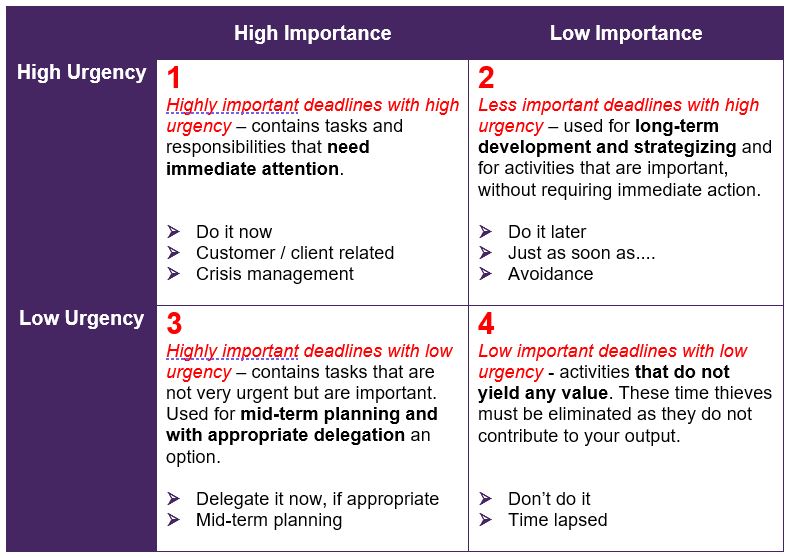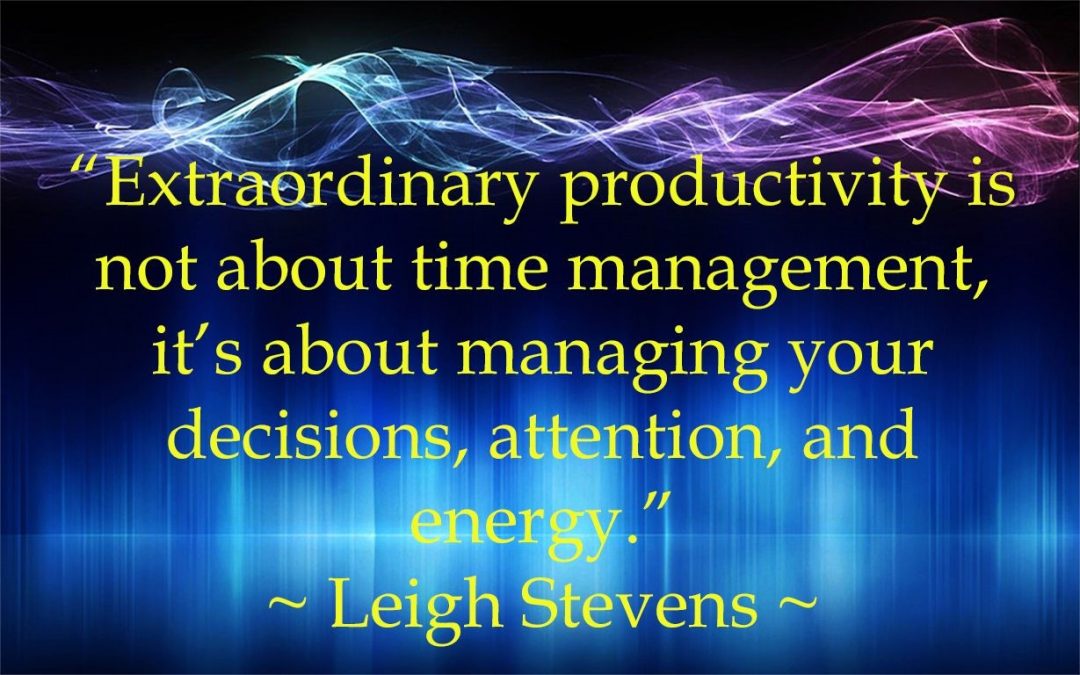How you manage your energy will determine how well you manage your use of time on a daily basis.
Time manages itself – what you manage is your energy – your attitude, conscious thought and decision-making and your self-care. All these contribute to keeping your energy levels high.
Time, or the perceived lack of it, is a recurring issue with my clients and I wonder if you can relate to some of these:
- “I don’t know where that day went to!”
- “I wish there were more hours in the day”
- “I can’t do it, I don’t have enough time”
For business owners and managers, managing your energy and your use of time is a critical skill. There are no magic formulas – managing your use of time is a collection of attitudes and practices, that are results oriented rather than activity oriented.
To help you manage your energy and raise it to new levels, try to apply some of these proven techniques.
- Your Attitude of Gratitude
This means making it a conscious practice to express thankfulness and appreciation for all the good in your life. When you repeatedly tell yourself you don’t have enough time, you create an attitude of lack, and then you work from there! This negative thinking impacts on the quality of your life and your ability to function well. Rather, find the good in your situation – express gratitude for the time you do have to complete a given task or activity, and develop your attitude of abundance. With this positive thinking and approach, you will be surprised at what you can actually get done in the time available to you.
- Manage Your Energy Levels and Daily Intentions
First, you need to build your awareness of these. Are you more productive first thing, mid-day or in the afternoon or evening? If your working environment permits, schedule your day around your ‘peak energy’ times.
It’s your choice! Every day on waking, don’t just tumble out of bed and go through your ‘normal routines’ which can become quite mindless. Set your clock a few minutes earlier and take this time, your time, to give thanks for the new day you have, and to set your intention for the day. Choose to approach everything with a positive attitude; decide on what exactly you plan to achieve and embed time for your personal activities.
- Don’t Get Boxed In!
Do you work in a cubicle or small office, are you on a pc, ipad or mobile phone for most of your day and how much time do you then spend in front of the TV or your personal digital devices when at home? This is energy draining and over an extended period of time, is detrimental to your health! Let nature nurture you – take a walk outside every day, at lunchtime if possible, and then in the evenings or on your off-time. Consciously breathe the air in deeply, feel your torso expanding, and then exhale slowly. Do this for a few moments at the start of your walk and then notice the feeling of increased energy levels and aliveness as you walk at a brisk pace.
Reduce your TV time and actively pursue other hobbies or interests. And most importantly, do a digital detox! Set a specific time for this and then consciously switch off – for your own health and as a good example to your children. Life won’t pass you by if you are not online incessantly.
- Plan Your Day to Make the Best Use of Your Time
Making the best use of your time is the most important decision you will make daily and this is achieved by your planning, scheduling and even eliminating some of your activities and tasks. Not everyone likes to plan their day / work shift or to make lists, much less keep them updated, but this practice is a real time-saver.
If you take your eye off your priorities, you can never be effective. Top performers are ruthless about their priorities – they are crystal clear what they are and they work consciously to give them a lot more time.
The Priority Matrix distinguishes between what’s important and what’s urgent. This differentiation is critical to managing your time to best effect as most people lean towards urgent tasks being a priority – but not so!
- Important responsibilities contribute to the achievement of your goals.
- Urgent responsibilities require immediate attention and they are often closely linked to the accomplishment of someone else’s goal.
Your goals, both personal and professional, are your ultimate responsibility and learning how to differentiate between ‘important’ and ‘urgent’ activities will help you stay focused.

- The Power of Your Sleep
During high-quality deep sleep, your body restores many functions it calls on during daily life, a restful mind, a strong immune system, improved muscle tone and blood flow, steady hormone levels, and a much-improved appetite. While there are advocates of only having four or five hours sleep each night, this is not recommended. An average sleep of between seven to eight hours is required to enable your body to recharge and re-energise, which in turn enables you to be more creative, focused and consciously productive.
I hope you find this helpful and if you have any questions on the above or would like to connect with me for a quick chat, please email me at charley@charleyswords.com.

Did you find this article helpful?
Let me know what you think about this post in the comments box below.

